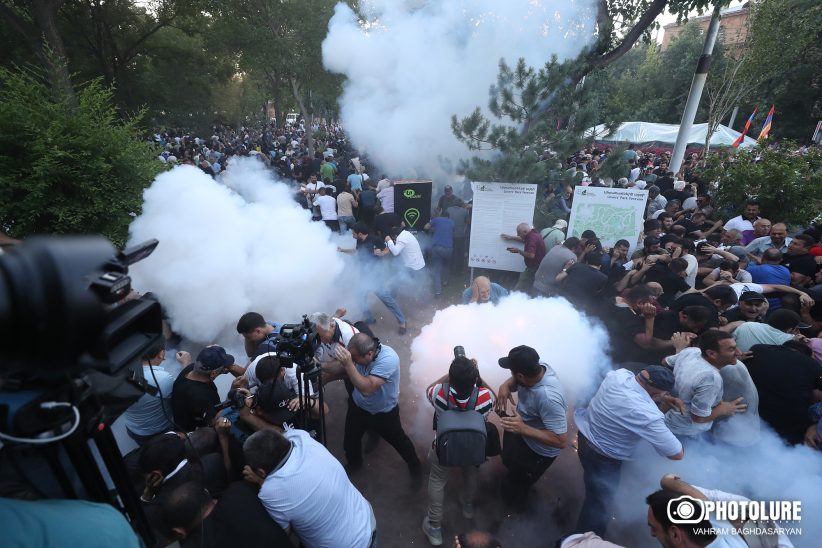The reports by international organizations published in the first half of 2019 demonstrated an essentially different assessments of the freedom of expression in Armenia. Thus, on April 18, Journaists without Borders recorded an unprecedented progress in Armenia in its World Press Freedom Index 2019: Armenia improved its position by 19 points, ranking the 61st as compared to the former 80th position. And already on June 5th Freedom House Human Rights Organization published Freedom and the Media 2019: A Downward Sprial report, according to which, as compared with the situation in 2017, there was no progress recorded in the Armenian media, even though the forces that had come to power in the country “are more inclined to embrace media criticism, than their predecessors.”
The first half of 2019 witnessed an unprecedented rise in court cases with the involvement of journalists and the media. The number of such cases equals 56, whereas the same period of the last year saw 10 cases. Moreover, one of the cases in 2019 is a financial-economic dispute, the other two were cases on the violation of getting information and the remaining 53 were based on insult and slander under article 1087.1 of the RA Civil Code. This is probably due to the fact that the media, especially the social media, abound in hate speech, fake news and manipulations often proposed as criticism.
Out of the abovementioned 56 new court cases with the involvement of journalists and the media, applications were filed by 19 ordinary citizens, 19 politicians, state officials (including former ones) or state bodies, 7 business people or private companies, 3 NGOs, 2 judges, and 2 lawyers. 2 cases are disputed between media and/or journalists, still in 2 cases media outlets sued state bodies.
In the monitoring period, politicians, state officials, other public figures still tend to go spare, get offended or display contempt and decide “to teach journalists a lesson” when asked annoying questions. This behavior is typical of Gagik Tsarukyan, the President of the “Prosperous Armenia” party, which resulted in two successive statements made by 10 media organizations.
In general, the CPFE recorded 151 violations of rights of journalists and media outlets, including 2 cases of physical violence, 83 cases of pressure on the media outlets and their representatives and 66 violations of the right to receive and disseminate information.
The first half of 2019 was noted by the ownership redistribution of media outlets, TV companies in particular. Previously the new government would take control of the broadcasting sector, make TV companies serve their interests or sell a TV station to loyal entrepreneurs, but now it was not the case: the mass media ownership was redistributed among former state officials without intervention on the part of the new government. A notable example is the split of “PanArmenian” media holding and the sale of the affiliated media to different companies, founded by people related to former state officials.
These processes, as well as the use of the media founded or sponsored by different political powers as tools of propaganda further polarized the news media industry, splitting it into different camps. Therefore, it has become an urgent issue to ensure transparency of the mass media ownership and sources of finance, which presupposes legislative reforms. Within the monitoring period, the Committee to Protect Freedom of Expression, in cooperation with Yerevan Press Club and Media Initiatives Center, completed drafting the new Law On Television and Radio, which provides new mechanisms of not only ensuring transparency in the broadcasting industry, but also modernizing relations therein and triggering competition. The draft was brought before Parliament and opened up for general discussion.
In April, the CPFE introduced three more drafts to three parliamentary factions proposing amendments to the Law on Procurement, Law on the Local Self-Government in the City of Yerevan and the Law on the Protection of Personal Data. They aim at the abolition of unfounded limitations to freedom of information and activities of journalists in the abovementioned laws. The first two of the drafts were tabled for discussion by “Bright Armenia” faction. In the NA session on June 4, the amendments proposed to the Law on the Local Self-Government in the City of Yerevan was adopted at first reading. The other two are under discussion.
Within the monitoring period, the CPFE continued following criminal cases linked to the events in Baghramyan Avenue (#ElectricYerevan), June 23, 2015, in Khorenatsi Street and in Sari Tagh, July 29-30, 2016, accompanied by large-scale violence and hindrances to professional activity of journalists and cameramen. The first case was suspended by the Special Investigation Service on March 4, 2019, on the grounds that “the persons to be involved as defendants were unknown.” On April 2, the CPFE’s lawyer, who protected the interests of the injured or victim journalists, filed a complaint to the RA Prosecutor’s Office, which repealed the decision of the SIS and assigned them to restart the preliminary investigation. With regard to the case in “Sari Tagh” suspended last year, the CPFE supports the victim journalists to appeal the decision of the SIS in court. After the Court of First Instance of General Jurisdiction of Yerevan rejected the appeal on April 4, a complaint was filed to the Court of Appeals on May 8th. Investigation is still underway.








